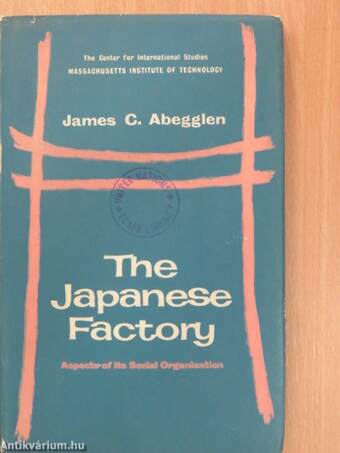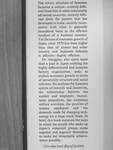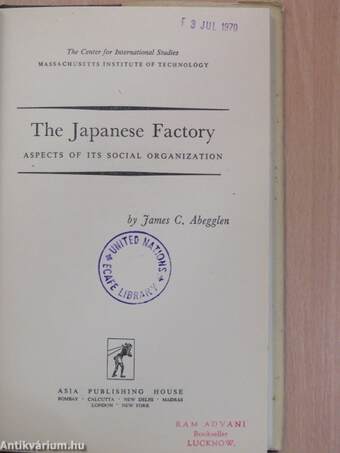1.116.971
kiadvánnyal nyújtjuk Magyarország legnagyobb antikvár könyv-kínálatát
The Japanese Factory
Aspects of Its Social Organization
| Kiadó: | Asia Publishing House |
|---|---|
| Kiadás helye: | Bombay |
| Kiadás éve: | |
| Kötés típusa: | Fűzött kemény papírkötés |
| Oldalszám: | 108 oldal |
| Sorozatcím: | |
| Kötetszám: | |
| Nyelv: | Angol |
| Méret: | 22 cm x 15 cm |
| ISBN: | |
naponta értesítjük a beérkező friss
kiadványokról
naponta értesítjük a beérkező friss
kiadványokról
Fülszöveg
The social structure of Japanese
factories is unique—entirely diffe-
rent from that in other industrially
advanced countries; entirely diffe-
rent from the pattern that has
developed in India; entirely incon-
sistent with what is generally
considered basic to the efficient
conduct of a business concern.
Yet the rate of economic growth of
Japan since 1870 has been higher
than that of almost any other
country and Japanese industry
is efficient—highly efficient.
Dr. Abegglen, who spent more
than a year in Japan studying the
highly differentiated and complex
factory organisation, seeks to
explain economic growth in terms
of personality structure and social
relations. He analyses the Japanese
system of rewards and incentives,
the relationship between the
worker and employer, recruit-
ment procedures, the numerous
welfare activities, the position of
women employees and the
demands made by changing tech-
nology on a large work force. In
brief, this book... Tovább
Fülszöveg
The social structure of Japanese
factories is unique—entirely diffe-
rent from that in other industrially
advanced countries; entirely diffe-
rent from the pattern that has
developed in India; entirely incon-
sistent with what is generally
considered basic to the efficient
conduct of a business concern.
Yet the rate of economic growth of
Japan since 1870 has been higher
than that of almost any other
country and Japanese industry
is efficient—highly efficient.
Dr. Abegglen, who spent more
than a year in Japan studying the
highly differentiated and complex
factory organisation, seeks to
explain economic growth in terms
of personality structure and social
relations. He analyses the Japanese
system of rewards and incentives,
the relationship between the
worker and employer, recruit-
ment procedures, the numerous
welfare activities, the position of
women employees and the
demands made by changing tech-
nology on a large work force. In
brief, this book examines the ways
in which the people who make up
Japan's industrial groups come
together and organize themselves
to make her remarkable achieve-
ments possible.
(See also back flap ofjacket)
The Center For International
Studies was founded at the Massa-
chusetts Institute of Technology in
1951 to serve three related purposes.
First, it was to conduct social science
research on problems posed by the
interaction of developing societies in
the world community. Second, it was to
contribute to training American and
foreign specialists in international affairs
and to enlarging every M. I. T.
graduate's understanding of world
problems. Third, it was to be helpful to
citizens and officials who deal with
policy issues of international relevance.
The Center's establishment reflects
M. I. T.'s growing conviction that, as
a center of learning in the natural
sciences and engineering, it must devote
more attention to the social, political,
and economic aspects of technological
change. The Center offers no courses or
degrees of its own, but many staff
members participate in the teaching
programs of the Institute's regular
departments.
The Center has been carrying on
research into the problems of economic
development of India and other coun-
tries since 1953.
James C. Abegglen is Operations
Manager with the International Stan-
dard Electric Corporation in Tokyo,
Japan. He was born in Marshfield,
Wisconsin in 1926 and received his Ph.D.
in Psychology from the University of
Chicago in 1956. He was a Ford Founda-
tion Foreign Area Training Fellow in
Japan from 1954-56. He has been an
Instructor and Research Associate at
the University of Chicago and was
Assistant Professor of Psychology (visit-
ing) at the Center for International
Studies, Massachusetts Institute of Tech-
nology from 1956-57. He is the*author
and co-author of several books and
articles published in the Harvard Busi-
ness Review and other journals. Vissza
Témakörök
- Szociológia > Szervezetszociológia > Munkahelyek
- Közgazdaságtan > Közgazdasági elméletek > Tőkés országok gazdasága
- Közgazdaságtan > Vállalkozások > Vállalatok
- Idegennyelv > Idegennyelvű könyvek > Angol > Szociológia > Szervezetszociológia > Munkahelyek
- Idegennyelv > Idegennyelvű könyvek > Angol > Közgazdaságtan > Közgazdasági elméletek > Tőkés országok gazdasága
- Idegennyelv > Idegennyelvű könyvek > Angol > Közgazdaságtan > Vállalkozások > Vállalatok
- Szociológia > Tanulmányok, esszék
- Idegennyelv > Idegennyelvű könyvek > Angol > Szociológia > Tanulmányok, esszék















